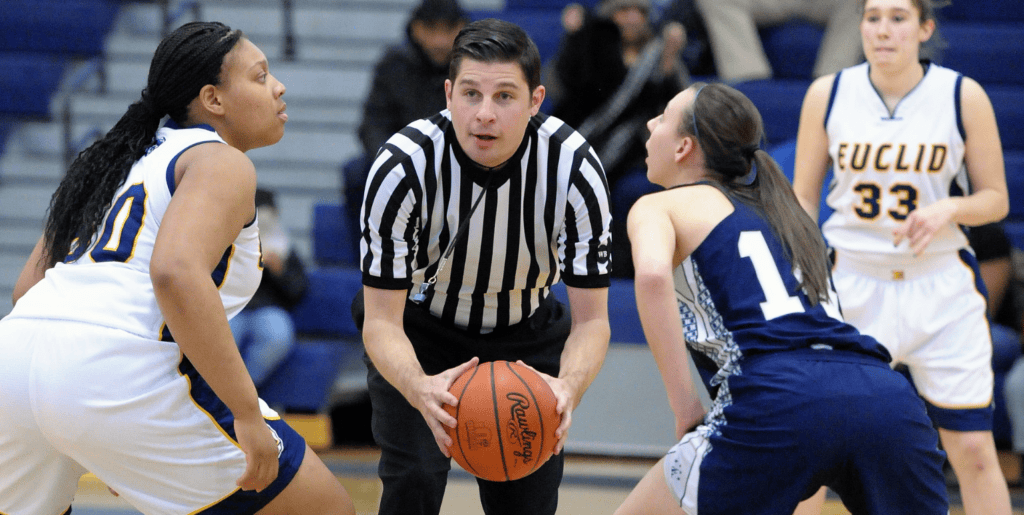PCA Resource zone
Gameday Tips for Officials

As officials, your job is to enforce the rules of competition. Unfortunately, people do not always treat those involved in competition, especially those officiating, with dignity. Officials face the challenge of upholding a positive, safe sports environment while making impactful decisions in the blink of an eye. The following tips will help you create a fair, safe, and respectful sports environment.
Before Competition
- Introduce Yourself
- When you first arrive at the playing space, introduce yourself to the coaches and players of each team. This familiarity can help humanize you and make dealing with challenges easier.
- If you have the time and it’s appropriate, introduce yourself to the spectators on the sidelines as well.
- Set Clear Expectations
- Address athletes and coaches and let them know your philosophy on officiating.
- Set expectations for how you prefer to handle interactions or questions they may have. Remind them that you are here to keep the game fair, and safe and encourage them to all help make this a positive experience for all.
- Align with Partner Officials
- Connect with fellow officials and get on the same page. Make sure you are aligned on how you want to call the game, how you will support each other, and how you will handle challenges.
During Competition
- Remember the Rule of “First 15 Contacts”
- The first part of the game is the learning phase for players, coaches, and officials. People will evaluate what you call or don’t call in the early stages of the game and adjust their tactics accordingly. This is where you can set the tone of your officiating style.
- Nip Problems in the Bud
- Address violations that take away from a positive sports experience as soon as you see them. E.g. Players not treating opponents well, spectators putting each other down, or unsafe play.
- Effectively Navigate Confrontations
- Comments from parents/caregivers, athletes, and coaches could challenge you in keeping your emotions in check. Keep your focus on what you can control – your effort in getting to the right position to make calls, how you move on from mistakes, and the confidence with which you make your calls.
- If you feel your emotions building up, use a self-control routine, like taking a deep breath or counting to ten in your head to better respond to challenges you may encounter.
- Coaches and athletes may have seen things differently than you, but if you explain your point of view calmly, they’ll have a better understanding of why you made the call you did.
- Project Confidence
- While you can’t control the reactions to your calls, you can control how you make those calls. Be confident and decisive in your calls and gestures during the game.
- Always hustle to be in the proper position to maintain open looks, call what you can see, and know your areas of responsibility.
- Bounce Back from Questionable Calls
- As a human, you may make mistakes from time to time. Accept that fact and try to move on from mistakes in the moment to avoid being distracted. You’ll have time after the competition to reflect on and learn from mistakes.
- Avoid getting into the habit of ‘make-up calls.’ If you can move on from a mistake quickly, it’ll have little influence on how you make subsequent calls.
- Control the Sidelines
- When possible, work with coaches to control the sidelines. Coaches can let unruly fans know directly of their potential negative impact.
- Emphasize the importance of maintaining a positive experience for the athletes.
- Check-in with Fellow Officials
- During stoppages, and especially towards the end of game when things can get more heated, check-in with fellow officials to discuss the flow of the game, potential adjustments or things to look out for, and gather feedback if needed.
Following Competition
- Appreciate Everyone Involved
- If all went smoothly, appreciate the efforts of everyone who contributed to a positive experience – players, coaches, spectators, and fellow officials. Reinforcing positive actions make them more likely to happen the next time out.
- Reflection
- After you’ve had some time to decompress from the competition, reflect on your performance as an official. Is there anything you’d do differently? What is something you can think about heading into your next competition?
- Reach out to your fellow officials and see if they have any feedback that may help you improve.